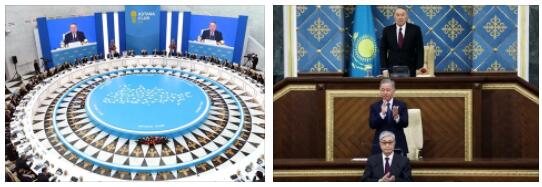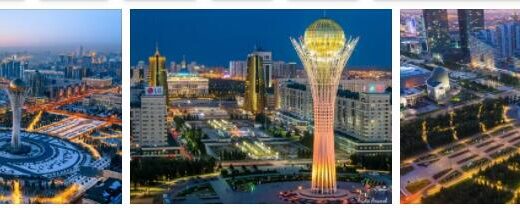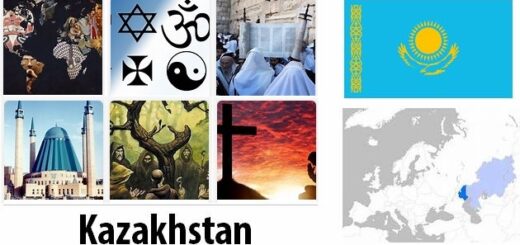State Structure and Political System of Kazakhstan
In the process of transition from the Soviet political and economic system to a political structure and economic management based on democratic principles, two stages can be traced in Kazakhstan: the initial one – 1991-94, which determined the development of the country and the reform of its political state system, and the period after the adoption of the Constitution of the Republic Kazakhstan (1995), which proclaimed and legally fixed the presidential form of government. Within the framework of the first, the sovereignty of the republic was proclaimed and legally fixed. On October 25, 1990, the “Declaration of State Sovereignty” was adopted, and on December 16, 1991, the Supreme Council approved the law “On the State Independence of the Republic of Kazakhstan”, which consolidated the status of Kazakhstan as an independent, democratic, legal state. On December 10, 1991, the previously elected president of the country, N.A. Nazarbayev – signed the Decree on renaming the Kazakh SSR to the Republic of Kazakhstan. Check equzhou for political system of Kazakhstan.
Kazakhstan is a republic with a presidential form of government. The President is the head of state, its highest official; a symbol and guarantor of the unity of the people and state power, the inviolability of the Constitution, the rights and freedoms of man and citizen. In the cases and in the manner prescribed by the Constitution, the President may dissolve Parliament; with the consent of Parliament appoints the Prime Minister, dismisses him from office; presides over government meetings on particularly important issues.
As a result of a referendum on April 29, 1995, the presidential term was extended to 2000, and on October 7, 1998, the parliament took the initiative to hold early presidential elections and extend the president’s powers for a 7-year period. On January 10, 1999, N.A. won the early presidential elections. Nazarbaev. The next elections are scheduled for 2005. The parliament of the republic is the highest representative body, exercising legislative functions. It consists of two chambers: the Senate (47 deputies) and the Majilis (67 deputies).
The Cabinet of Ministers of Kazakhstan represents and exercises executive power in the country. Prime Minister – I. Tasmaganbetov. The Constitutional Council is a state body that ensures the supremacy of the Constitution of the Republic of Kazakhstan throughout the country.
The Supreme Court is the highest body of judicial power in the state in civil, criminal and other cases, within the jurisdiction of courts of general jurisdiction.
The highest bodies of state power in their actions for the economic management of the country must rely on administrative-territorial units. There are (as of January 1, 2002) 14 regions of republican subordination, 160 districts, 196 settlements and 7743 auls (villages) in the republic. The largest region is Karaganda (428 thousand km2), the most densely populated is South Kazakhstan (17.5 people per 1 km2) and further in alphabetical order: Akmola, Aktobe, Almaty, Atyrau, East Kazakhstan, Zhambyl, West Kazakhstan, Kyzylorda, Kostanay, Mangystau, Pavlodar, North Kazakhstan. Check homeagerly for democracy and human rights of Kazakhstan.
The largest cities are: Almaty (1136 thousand people), Astana, Chimkent, Karaganda, Semipalatinsk, Pavlodar.
The internal political development of Kazakhstan is aimed at creating a democratic, peaceful, nuclear-free state, establishing a strong presidential republic in conditions of political and civil pluralism. Political and economic transformations in Kazakhstan are based on a developed economy with diverse forms of ownership.
The development of political and civil pluralism inevitably led to the emergence and development of a multi-party system. So, in 1999 there were about 400 public associations, including about 30 political parties and movements were registered: the Party of National Unity of Kazakhstan, the Democratic Party, the Peasants’ Union, the People’s Cooperative Party, the Youth Union, the Republican Party, “AZAT” ( “Freedom”), etc.
In 2002, the process of re-registration of parties began, which 11 associations joined, but only 7 successfully passed to the end: the Democratic Party of Kazakhstan (DPK) “Ak Zhol”, the Civil Party, the Agrarian Party, the Communist Party of Kazakhstan, the Party of Patriots of Kazakhstan, the Kazakhstan Social Democratic the Auyl Party and the Republican Patriotic Party (RPP) Otan. The latter is the largest of them (more than 100 thousand members), united with the Republican Party of Labor and the People’s Cooperative Party of Kazakhstan. The remaining parties have an approximately equal number of supporters provided for by the new legislation (50,000-60,000 people).
The foreign policy of Kazakhstan is based on the principles of openness, peacefulness, balance and consistency. The independence of the republic was recognized by 111 states, and diplomatic relations were established with more than 100 of them.
Diplomatic relations with the Russian Federation were established on December 22, 1992. In the spring of 1994, within the framework of the Treaty of Friendship, Cooperation and Mutual Assistance between the Republic of Kazakhstan and the Russian Federation, a package of 22 treaties and agreements was signed, incl. 4 at the level of heads of state. These are agreements on the further deepening of economic cooperation and integration; on military cooperation; agreements on the basic principles for the use of the Baikonur Cosmodrome and a Memorandum on Citizenship and Legal Status of Citizens of Both Countries.
Military cooperation with the Russian Federation is of fundamental importance for Kazakhstan, since the republican army is qualitatively inferior to the level of the Russian army. It has about 40-60 thousand military personnel, consists of 3 branches of the general-purpose troops, air defense and border troops. Moreover, the most combat-ready are the air defense forces, and the most numerous are the general forces.
Within the framework of the CIS, Kazakhstan takes a consistent active position. In September 2003, Kazakhstan signed an agreement on joining a single economic space within the borders of Russia, Belarus, Ukraine and Kazakhstan. The Central Asian direction of Kazakhstan’s foreign policy. At the beginning of 1994, the Treaty on the Creation of the Common Economic Space (SES) between Kazakhstan and Uzbekistan was signed (an agreement to which Kyrgyzstan later joined). However, despite a whole range of measures that were agreed upon at the intergovernmental level, this integration did not bring the expected results.
The country is actively involved in regional cooperation in Central Asia. In October 1992, Kazakhstan became a member of the Economic Cooperation Organization (ECO), founded in 1977 by Iran, Pakistan and Turkey. In 1992-93 Afghanistan, Kyrgyzstan, Uzbekistan, Turkmenistan, Tajikistan and Azerbaijan joined it.
In December 1995, the republic joined the ranks of the Organization of the Islamic Conference (OIC), which opened up the possibility of attracting financial investments from the Islamic Development Bank (IDB).
In the Asian direction, relations with China, which is rightfully considered one of the main world geopolitical centers of the 21st century, remain of fundamental importance for Kazakhstan. An important initial milestone in this regard is the Shanghai meeting (1996) at the level of heads of state – the Russian Federation, China, Kazakhstan, Kyrgyzstan and Tajikistan.
Relations with the US and the EU are turning into a number of specific areas of national foreign policy. The Washington Summit (February 1994) is considered to be the starting point for the beginning of relations between Kazakhstan and the leading economically developed states. Personal contacts between the presidents of the two countries to a large extent contributed to the formation and consolidation in the United States and throughout the world of the image of Kazakhstan as a democratic and developing state. Bilateral cooperation with Great Britain, France, Germany and others is also being strengthened.



